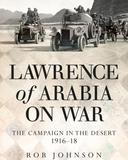Dr Robert Johnson
Dr Johnson’s specialisms are in War; Strategy and Strategic Thinking; and Conflict in South West and Central Asia
I work on the History of War in the nineteenth and twentieth centuries, with particular interest in the First World War, the Inter-War Years, and more recent conflicts in Asia. Thematically, I focus on strategy, conventional operations, tactical developments, revolutionary warfare, intelligence, and military thought.
Research Interests
I am the Director of the Changing Character of War Centre (Statecraft and Strategic Studies) which is an interdisciplinary study of strategy and armed conflict. The research priorities of the Centre are the changing relationship between war and the state, war in a connected world, and the impact of technology. CCW hosts a number of Visiting Research Fellows and non-resident Research Fellows. CCW has been particularly successful in developing the dialogue between scholars, the armed services, governments and multinational organisations, and engaging in joint research projects, conferences, and seminars.
I focus particularly on decision-making in strategy and war, including the intellectual developments of military theorists and practitioners. My work in history has concentrated on Asia, from the Middle East to East Asia, across various modalities of warfare, and the interactions of the 'West' with the continent.
See page on Pembroke College website
Follow me at @RJohnsonCCW1
Featured Publication
In the Media
Current DPhil Students
Matt Laird
Teaching
I would like to hear from potential DPhil students regarding:
Military and Strategic Thought
Conceptions of Future War
Electronic and Information Warfare
I currently teach:
War in the Modern World





